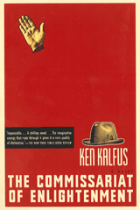The Commissariat of Enlightenment
In the years between Tolstoy’s death in 1910 and Lenin’s in 1924, a young Russian propagandist learns how to manipulate film, foreshadowing the global empire of electronic images that occupies our imaginations today.
- A New York Times Notable Book of the Year
"Astapov's distortions are the perfect metaphor for Kalfus's own special effects...Preoccupied with truth, media, history, and politics, this novel shows its mechanisms proudly."
— The New Yorker (review)
"It is always fascinating to me, as someone born in Russia, to watch an American absorb that country, or at least study the mind-set of its troubled people. To be repulsed by Russia, fine; to wish to exploit Russia, well, that's an understandable part of our capitalist credo; but to actually become Russian requires, among other things, intelligence, hubris, patience, fatalism, nicotine addiction, an angry gurgling somewhere above the solar plexus, and a fair shake of alcoholism. I have never met Ken Kalfus, author of the smart new novel The Commissariat of Enlightenment, so I do not know if I can ascribe to him anything but intelligence. Nevertheless, between this novel and the collection of stories entitled Pu-239 and Other Russian Fantasies, Kalfus has created a fictional, parallel Russia that reveals itself to the Western reader in all its soiled splendor. "
— Gary Shteyngart, Bookforum ("Lights, Camera, Comrades!")
"A brilliant fusion of satire, science fiction and political commentary. Gogol is probably tearing his hair out, wishing he'd dreamed this up."
— Kirkus Reviews
"Kalfus is doing what most gifted historical novelists do: picking one of the moments when the star of modernity first appeared in the sky, then staring at it until its very gravity seems to increase, drawing into its orbit any stray comets in the vicinity. [He] is foreshadowing a revolution, just not the one we think. For all his contagious fascination with 20th century Russian history, he's finally less interested in Bolshevism's overthrow of the bourgeoisie than in film's overthrow of fiction, the eclipse of the novel by mere novelty."
— David Kipen, The San Francisco Chronicle ("From Russia with brains: A dying Tolstoy sparks brilliant riffs about the birth of modernity")
"Some scenes of action and description are realized so vividly that they almost have the force of hallucination. There is a recurrent vein of dark humor, and a grim sense of the lethal absurdities of totalitarian politics. No one in this book looks at anyone else's face or listens to anyone else's voice, except out of fear or coercion. People's lives are shaped by images -- religious icon, propaganda poster, film. So they become in the end not much distinguishable from images themselves, manipulated elements in the dynamic of history, looking forward to our own time and the welter of mind-softening images in which we live. ''The Commissariat of Enlightenment'' is a chilling novel, but the imaginative energy that runs through it gives it a rare quality of distinction."
— Barry Unsworth, The New York Times Book Review (Ambiguous Light)
"It Started With a Vision of Tolstoy's Death, Then Segued Into a First Novel," Mel Gussow, The New York Times
"Lights, Cameras, Agitprop!" Jon Fasman, Washington Post
The Guardian
"Stalin's Lies, Our Lies," Laura Miller, Salon
"The Camera Lies," Peter Millar, The Times
Minneapolis Star-Tribune
Philadelphia City Paper
mostlyfiction.com
de Volkskrant








